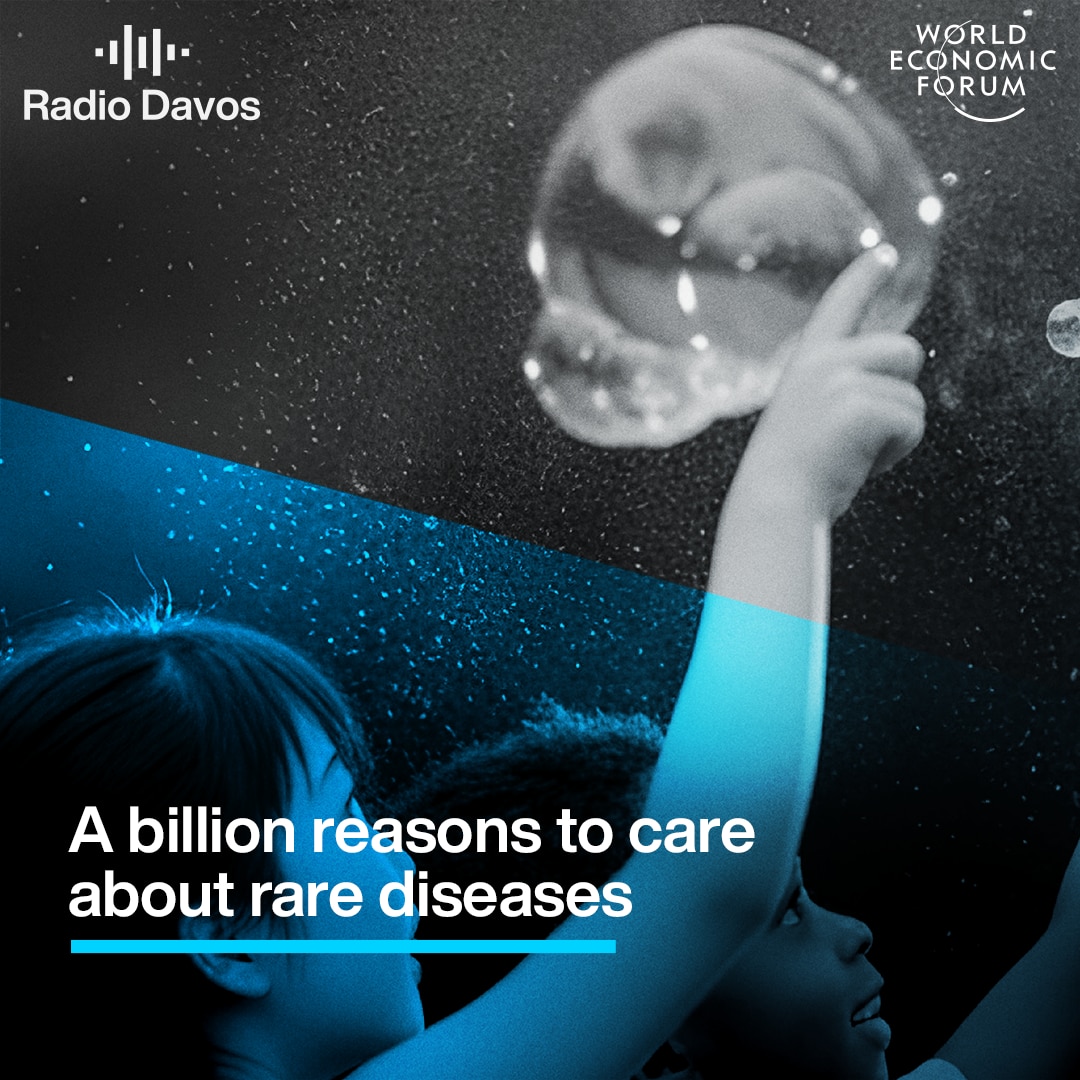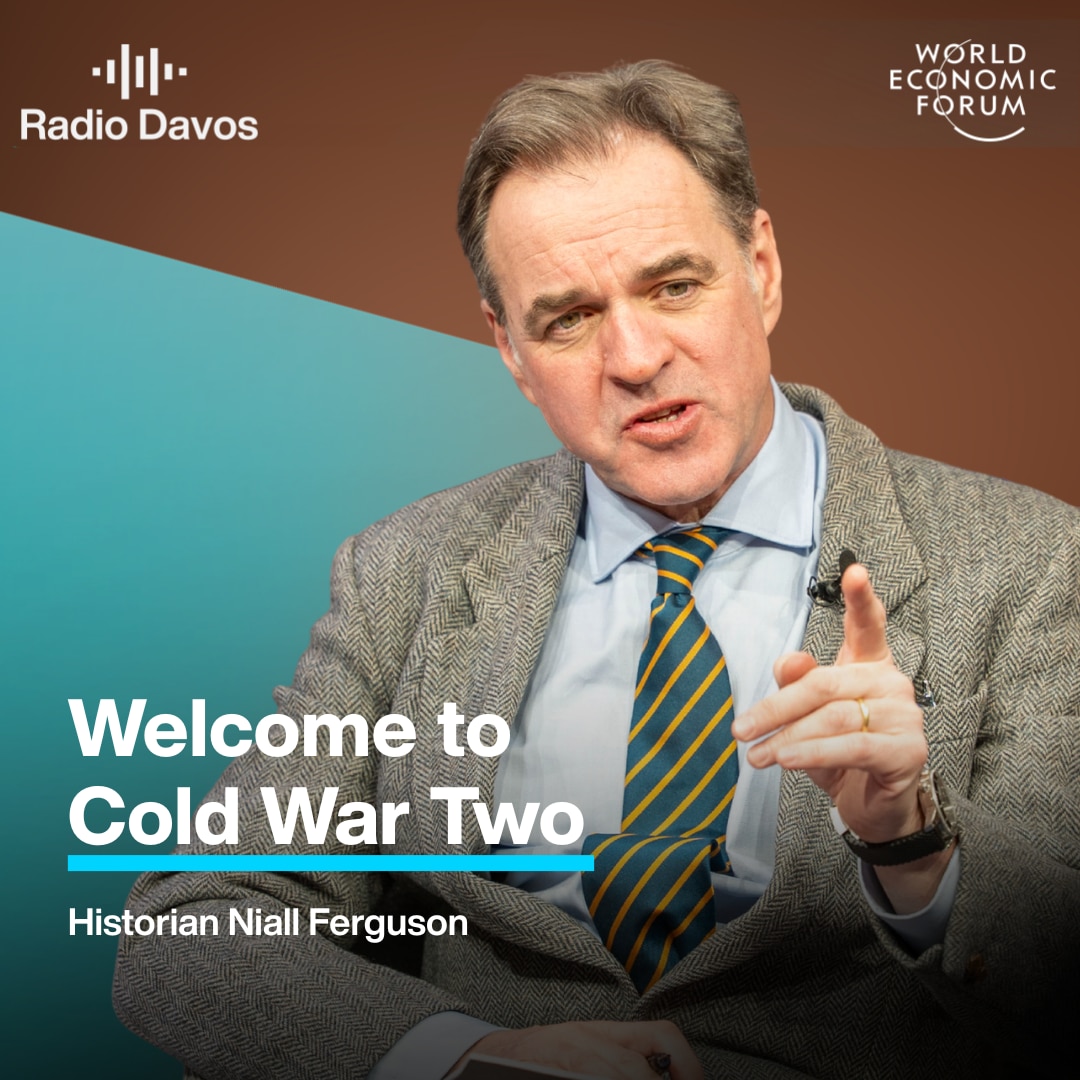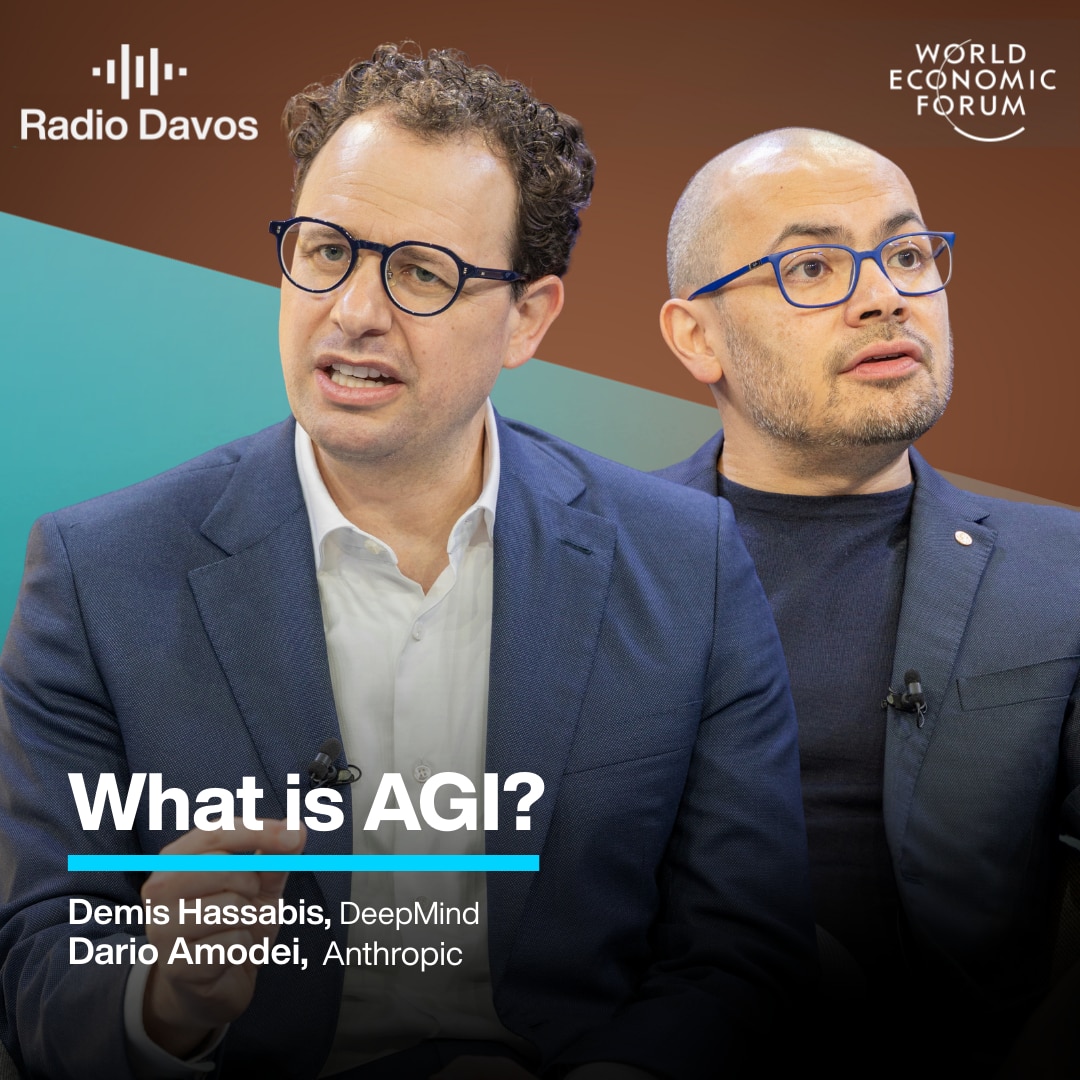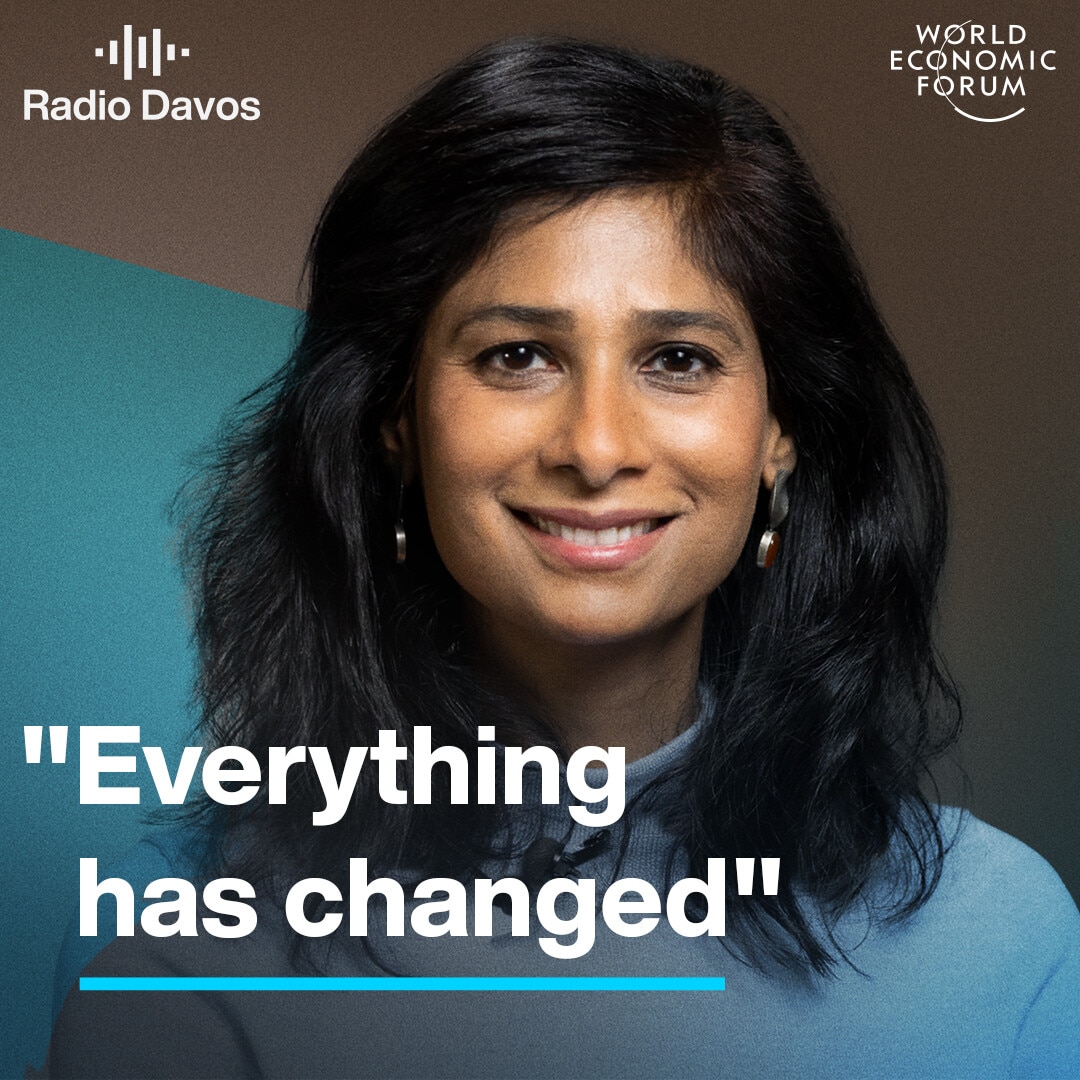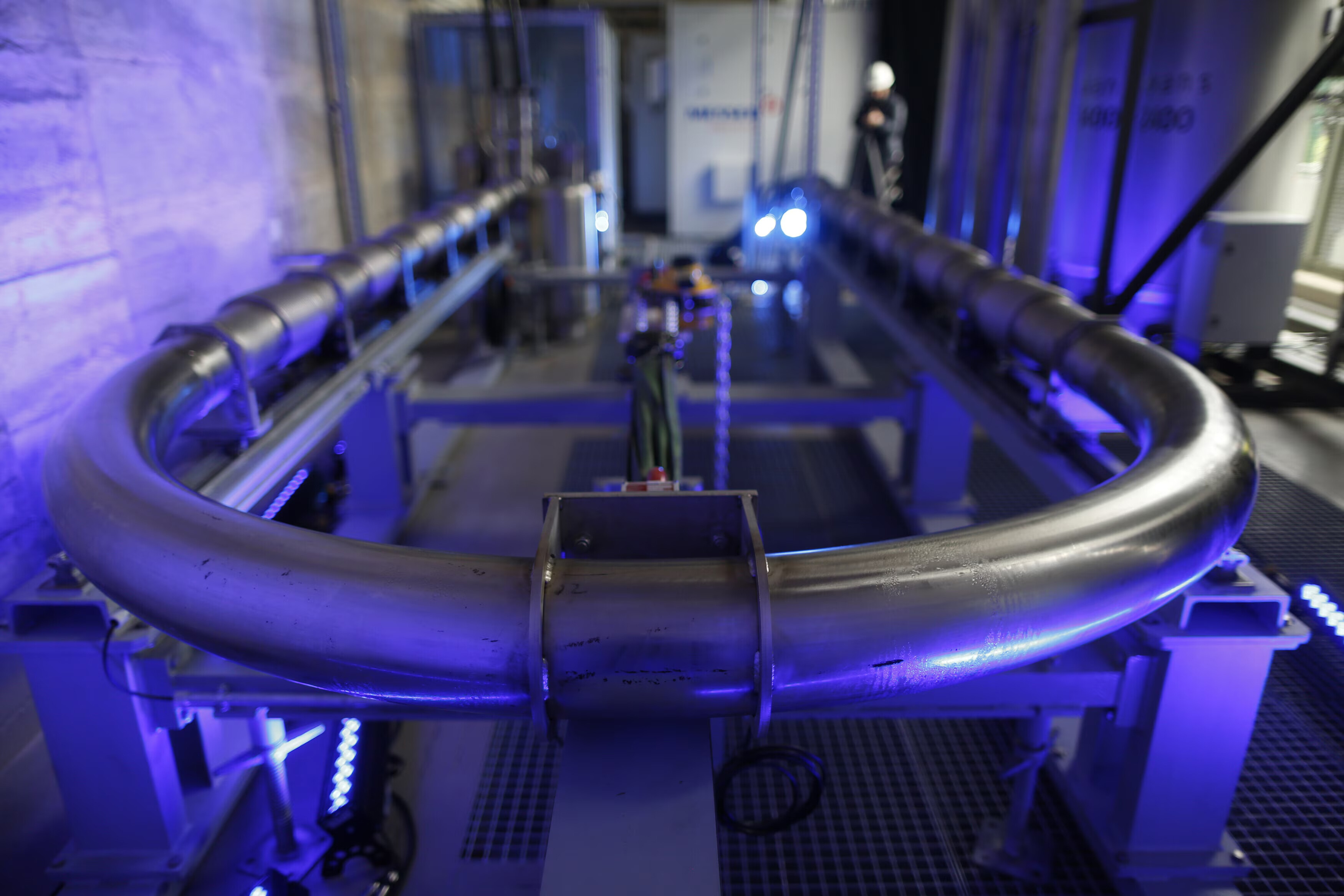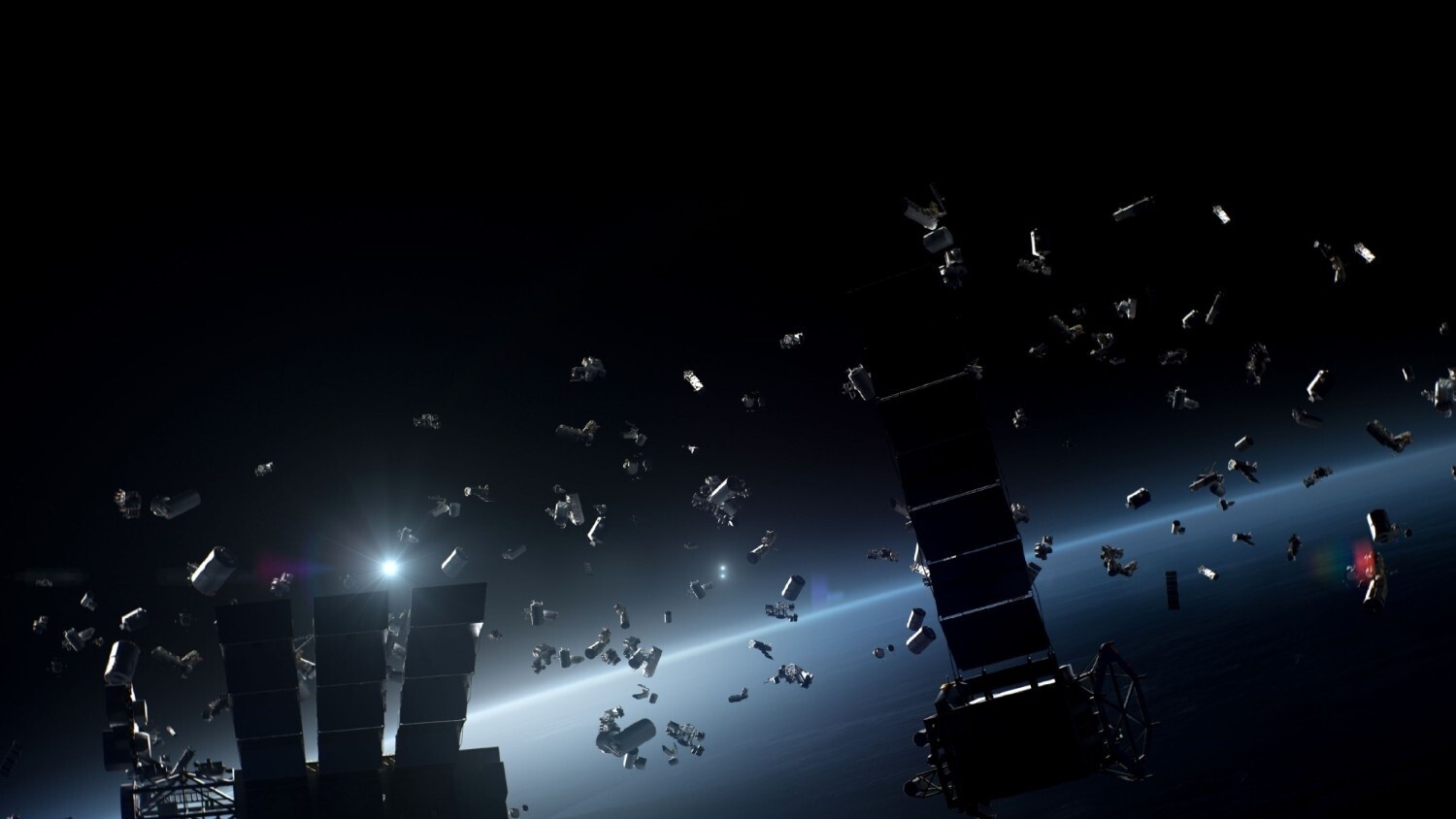Why are humans going back to the Moon, and is there really life on Mars?
ポッドキャスト・トランスクリプト
This transcript has been generated using speech recognition software and may contain errors. Please check its accuracy against the audio.
Pascale Ehrenfreund, President of the Committee on Space Research (COSPAR): Are we alone in the universe, and where do we actually come from? I think we are all here in order to explore the universe.
Robin Pomeroy, host, Radio Davos: Welcome to Radio Davos, the podcast from the World Economic Forum that looks at the biggest challenges and how we might solve them. This week we venture into space - to look for life on Mars.
Alexander MacDonald, Chief Economist, NASA: These are incredible worlds that we can see at night, in the night sky, and that we can go visit with our robotic emissaries today and potentially in the future with humans.
Robin Pomeroy: Yes, humans are planning to build a permanent settlement on the Moon and could feasibly land on Mars in the next decade. We speak to the chief economist at NASA.
Alexander MacDonald: We have begun the process of building habitable infrastructure around another world other than Earth.
Robin Pomeroy: And this ‘astrobiologist’ - yes that is a thing - says why she is excited about the search for ET.
Pascale Ehrenfreund: We are looking for life as we know it.
Robin Pomeroy: And the head of Space Technology at the World Economic Forum explains what all this might mean for those of us still with our feet firmly on Planet Earth.
Nikolai Khlystov, Lead, Space Technology, World Economic Forum: And the exciting story now is that these benefits are really increasing in what they really deliver for us on Earth. And I think this is really going to have a profound impact for all of us on the ground.
Robin Pomeroy: Find Radio Davos wherever you get your podcasts, or visit wef.ch/podcasts where you will also find our sister programmes, Meet the Leader and Agenda Dialogues.
I’m Robin Pomeroy at the World Economic Forum, and with this leap into space.
Nikolai Khlystov: Such a monumental event for everybody on planet Earth.
Robin Pomeroy: This is Radio Davos
Welcome to Radio Davos. This week we're talking space. And I have a co-host from the World Economic Forum, Nikolai Khlystov. Nikolai, how are you doing?
Nikolai Khlystov: Great. Great to be here, Robin. And excited to have this to have this conversation.
Robin Pomeroy: Why space particularly, why is that of interest to the World Economic Forum?
Nikolai Khlystov: Well, you can really look at space as just an extension of our Earth activities, really.
I mean, of course a lot of it is focused on science and exploration, but increasingly we're looking at what industry, what different industries can do in space.
Now that's still in the years to come, but today there are tremendous benefits through space data, through different space data that we get from satellites, thousands of satellites there in orbit.
Now, this data can come in the form of Earth observation imagery, and we're getting into different types of wavelengths and what we can see and that's valuable for industries, but that's also valuable for for societal issues and disaster response and weather monitoring, but also monitoring how the atmosphere is changing.
There is also, of course, the whole question of connectivity, with a number of constellations now providing many, many satellites, providing essentially internet connectivity from space to locations perhaps that don't have access to terrestrial internet. So this is incredibly powerful if you think about remote locations connecting them to the internet.
And of course, there is the the technology of global positioning navigation, which provides this signal that tells you where you are on the road or how do you get to your next destination. So this is incredibly important and actually underpins a lot of economic activity on the ground.
Robin Pomeroy: We're going to be talking to two experts. You convened at a recent World Economic Forum event, several space experts from different sectors, from government agencies, space agencies, from industry, academics.
What is the benefit of bringing those people together? How do they spark off each other? What do you what do you get from the meetings like that?
Nikolai Khlystov: Well, it's a good question, Robin. It's fascinating to be in these meetings. This is essentially what the forum does, and this is why I think we're quite unique in this role.
We bring together really the top experts from industry, but also from the governments that are really doing the most progressive work or really pushing the boundaries of policy and regulations, but also civil society. So whether these are experts, top experts from around the world, from academia, from different think tanks, different inter-governmental organisations, U.N.
When you bring them together and you put them in a small physical space and you start going at some questions, there are fascinating ideas that come up, right? And sometimes they bounce off each other and there are things that come up that perhaps they haven't thought about on their own before. And this is really how the magic happens in many Forum environments, not just when it comes to space.
Robin Pomeroy: And you've mentioned the work of the Forum is important in 'harnessing the benefits' of all these changes and all this progress that's happening in space, harnessing the benefits of that for people on Earth. What kind of benefits are you thinking of, or what what are you doing that may help harness the benefits?
Nikolai Khlystov: The exciting story now is that these benefits are really increasing in what they really deliver for us on Earth.
So Earth observation is one, the technology that comes with Earth observation satellites, essentially satellites looking down at our planet and being able to capture more and more detail, more and more change when it comes to nature, when it comes through to our oceans, when it comes to the environment, the physical environment, essentially those capabilities are getting better and better.
So, for example, we can monitor now different methane leaks and actually a lot of cases, those leaks are unknown even to to the to the actors responsible for them. So actually, even just saying, hey, look, you have a you have a problem there, can you address that? I mean, that's a it's a hugely important capability.
That's just one specific example, you know, that extends to monitoring moisture levels, flooding, being able to understand which areas are cut off.
There's a lot of that that Earth observation satellites can do. They can also monitor shipping traffic and illegal fishing and optimise routes when it comes to moving goods around the world.
So that's one capability. The other one is on connectivity and being able to, again, provide that signal to locations that perhaps have never had that signal before and able to connect those communities in remote locations.
Robin Pomeroy: Are some of those things things that might not happen anyway if you took the World Economic Forum out of the picture, if you had less of this cooperation and meeting of minds, do you think that there would be a risk that some of those things might be neglected or not used to their full extent?
Nikolai Khlystov: Where we've seen really impact from some of these convenings that we organise and we bring stakeholders together and sometimes publish those outcomes in the form of White Papers, have to do with helping accelerate some of the change, helping pull in the actors that otherwise perhaps were just on the sidelines. And were maybe just following the conversation, but they haven't really fully immersed into it.
And so helping accelerate some of the change, inform some of the decision makers that otherwise may not be moving as fast. And maybe not be paying as much attention as they could have been.
I think this is really exciting, particularly when it comes to some of these developments in the acceleration and benefits of space data.
Robin Pomeroy: Well, as I said, we have two interviews on this episode. Later on, we're talking to someone who is looking for life beyond earth. Real fundamental question. So interesting to hear someone who's seriously doing that. For those of us who aren't into this, I'm not sure we were aware that work was even going on.
But first we're going to talk to someone. It's a job I didn't know existed. NASA, the American Space Agency, everyone knows, but it has a chief economist. Could you tell us something about Alex, please?
Nikolai Khlystov: Both of those conversations are absolutely fascinating. We, of course, at the Forum do not look at those topics directly, but both brilliant individuals and professionals, they're both members of our Global Future Council on Space.
But Alexander, obviously, as you said, chief economist of NASA, really looks at how do we make some of these activities, space activity, competitive? How does NASA work with the commercial sector? This is really the big change that has happened over the last ten years or so in ways that NASA works with private sector. How does it outsource, in a way, some activities in a way that then it makes it maybe more efficient, but also allows NASA to focus on some of these other bigger and grander goals?
Robin Pomeroy: One of those big missions that NASA is concentrating on is developing the Moon. Let's go to the horse's mouth and hear the chief economist of NASA. This is Alexander MacDonald.
Alexander MacDonald: I'm Alexander MacDonald. I'm NASA's chief economist
Robin Pomeroy: Why does NASA have a chief economist?
Alexander MacDonald: Well, as the first NASA chief economist, it's been an interesting journey.
NASA didn't obviously start with economics as one of its kind of core leadership positions. But as we've begun working more and more with the private sector, it's become important to conduct economic due diligence of companies. And it's also become important to think about how NASA plays a role in the expanding commercial ecosystem, the expanding space economy.
NASA is a mission focused agency for exploration, planetary science and also aeronautics. And there are economic elements of all of those areas that impact national growth, that impact the global economy. And so as the space economy has grown, NASA's role within the space economy has become something that it's more interesting understanding. And it's been fun to work with the agency to help them figure it out.
Robin Pomeroy: I suppose the private sector's always been involved with NASA. When you look back over the the Moon landings and the, I don't know what the figure is for the number of people who were involved in that...
Alexander MacDonald: Hundreds of thousands.
Robin Pomeroy: Hundreds of thousands and hundreds or maybe thousands of companies involved in contributing towards that - run by NASA, the mission, the Apollo missions, which is a government funded, non-profit kind of body. But there's been a change of there in recent years that's been quite noticeable by the general public. Can you just talk us through kind of how, what that transformation is and where it's going?
Alexander MacDonald: As you mentioned, the Apollo programme involved a lot of different contractors, but they were really doing work to the specific requirements of NASA. And they would then transfer that hardware to the US government for the US government's exclusive use.
And around the mid 2000s, there was an understanding that there are potential commercial markets. By the mid 2000s there was already, for example, an international commercial launch market. Rockets would be launching commercial satellites to geosynchronous orbit for commercial communication satellite purposes.
And at the time, the US had actually basically not had a competitive position. There were no US commercial launches. The market was mostly dominated by other firms from other countries. And there was an understanding that the types of rockets that NASA needs to deliver cargo to the International Space Station are also the types of rockets that could compete in the international commercial launch market.
And so a programme called the Commercial Orbital Transportation Systems Program, COTS, began, gave about a half $1 billion to a couple of companies, one of which was SpaceX.
And that created a different model because this was not transferring these rockets over to NASA. This was first giving funds directly for the development of these systems to commercial companies.
And then after COTS, there was the Commercial Resupply Services programme that purchased services of the delivery of cargo to the International Space Station. And that meant that the companies owned the hardware and were then free to sell the services of that hardware to other interested parties, including commercial launches.
And that began NASA's shift to leveraging the commercial sector for space exploration activities. Today, we're actually leveraging commercial services contracts for our return to the Moon.
And this has taken advantage of significant investments in space by venture capital, by the private sector. We're now seeing regularly close to $10 billion a year, roughly, of venture capital and private equity investments in the space sector, which is a significant increase from where we were, say, 20 years ago. And much of that is due to NASA's shift in the strategy.
So we're putting more money into the overall sector by taking this strategy on. And we're also having more of a portfolio approach. Rather than having kind of one company that will be doing these different types of missions, we'll often have multiple companies, and this creates a resilience and robustness in both the kind of space economy overall, but also in NASA's missions.
Robin Pomeroy: Has it changed the way space is viewed by the general public, do you think? In what way?
Alexander MacDonald: I certainly think it's brought a lot of excitement back. Certainly, private companies are able to take risks that maybe a government agency can't always directly take themselves. And so we're seeing a massive increase in capabilities.
Reusable rocketry being the most obvious one. Seeing rockets launch into orbit and then return to the pad. It's something that we did not have 20 years ago. Today it happens 100 times a year.
That is a significant change in the visibility of space, in the pace of innovation of space. And I think the public sees that. I also think public sees that there are more and more people going to space from different countries in different walks of life.
You don't have to be an astronaut to go to space anymore. And so we're seeing a lot more people go into space as customers and we're seeing a lot more countries go into space than ever before.
And so I think that's increasing the visibility of the sector overall and certainly the kind of dramatic achievements that we're seeing, like large, large rockets being captured by chopsticks is just gaining some attention.
Robin Pomeroy: People who aren't fascinated by those images like the one you just mentioned, and just the romance and the glamour of space would say, why are we spending all lot money up there? How is it helping me? What do you say to them?
Alexander MacDonald: Well, first off, no money is spent in space. All of the money is spent terrestrially, results in jobs on Earth. But what else do we get from space?
Well, space overall today is roughly kind of a $500 billion plus, you know, economic sector. And the majority of that is communications. Increasingly, you get your internet from space. You certainly if you have satellite television, get your television from space.
Perhaps the most important contribution to the global economy comes from our global positioning satellite system, which is how you often navigate city, get a, you know, a rideshare app. It's how we do timing for our financial systems. Much of the modern world runs off of the GPS system. And that's because we have systems in space that provide that positional information to people on Earth.
And then, of course, our understanding of climate change fundamentally comes from having satellites in orbit around the Earth, looking at Earth and measuring the changing planet, measuring the change in climate. And increasingly it's even being used in a potential mitigation applications.
So in addition to the fundamental Earth science that satellites able to support and have allowed us to understand the types of changes that are happening, now satellites are being developed that can actually observe point source greenhouse gas emissions of methane, which is potentially the solution for a global accountability system.
There's a lot of ways in which space technology fundamentally supports our quality of life on Earth. And that comes from kind of an ambition to go and explore the stars. And so I think all of these things are tied. We have the kind of quality of life and modern technological economy, in part because of the ambition of of spaceflight.
Robin Pomeroy: And the private sector is more and more interest, as you mentioned. Can we talk a little bit about what the successor to the International Space Station? That kind of laboratory in space is seen as this wonderful collaboration of countries to further human knowledge. But it's going to be retiring. What will replace it, from NASA's point of view?
Alexander MacDonald: Yes. So the International Space Station, I think, is really one of the greatest engineering achievements of the late 20th century and early 21st century. It's an international collaboration. We've now been living in space continuously on the ISS for well over 20 years. That's an incredible achievement.
At the same time, it's an expensive system to maintain. And as NASA is shifting its resources to taking humans back to the Moon, we want to reduce the amount of expenditure that we're making for human spaceflight in low-Earth orbit.
And so as part of that, we're looking to buy services from new commercial modules. And so we're starting up a programme called the Commercial Low Earth Orbit Destinations programme. And this is providing funding to different companies to design and build commercial space stations from which NASA can in the future buy services for its astronauts to go up and do research, prepare for longer exploration missions.
And so this is a is a similar type of partnership to what we have with commercial crew delivery and commercial cargo delivery to the International Space Station today. But in the future, the space station would also be a commercial enterprise, could still be an international commercial enterprise. And in fact, many of the companies who are developing potential solutions to this are partnering internationally.
So I think it will be it'll be different, but it'll also be very similar. It's still going to be international enterprise and we're still going to be doing really fascinating research into human spaceflight exploration capabilities and fundamental research for microgravity.
Robin Pomeroy: So in theory, we don't know yet, I guess, but there could be lots of little International Space Stations up there where astronauts can go up or the experiments can take place. It won't just be one in the future.
Alexander MacDonald: This is one of the great economic questions, which is how much demand is there, for how many different commercial space stations? And to your point, we don't know. There's really only one way to find out, which is to have different products go to the market and see how much demand there is.
But certainly NASA recognises that we have a need for enough low-Earth orbit human spaceflight activity for at least one commercial space station. And I suspect there might be the potential for more.
Robin Pomeroy: As an economist, I suppose competition is interesting. If there's lots of entities competing in a market, prices might come down or new innovations might be created because people are rushing against each other.
It's funny that the space race used to be a competition between the United States and the USSR, which isn't really the case anymore. Now you perhaps got rivalries, maybe healthy rivalries, let's hope, between private companies.
There must be pros and cons to the way things are going in terms of healthy competition, but also spiky rivalry sometimes. I'm talking about between companies, but also between countries. Is that something that you ever think about?
Alexander MacDonald: Certainly we rely on multiple providers competing to secure NASA contracts in the future in many of our most recent programme developments.
When we started on the path of developing commercial crew capabilities, it was through choosing two companies to provide commercial crew transportation at the International Space Station. And in addition to the competitive effects, potentially, you know, kind of keeping prices down, it also provides critical resiliency, as we saw recently when we were able to launch our astronauts to the space station in one commercial vehicle and then return them in a different commercial vehicle.
That provides safety, which fundamentally is our number one priority when it comes to human spaceflight.
And so we've started to apply a kind of a competition model within a number of our programs, commercial lunar payload services as well has a number of different companies who are all competing to win contracts to deliver NASA's science payloads to the Moon.
And we're finding that it's it's quite effective. I would say it's probably more important to have competition from a resilience perspective and a robustness perspective in a programme than necessarily from a price perspective, because overall, sometimes these markets really still only have a few customers.
Robin Pomeroy: You mentioned earlier the NASA plans to send people back to the Moon. Not been there since when?
Alexander MacDonald: In 1972 was the last time.
Robin Pomeroy: 1972! Back then it was partly this kind of national pride thing, was it Let's get to the Moon and show the world. We've kind of, humanity's done it. I wonder why we're going back. From an economic point of view, what are the benefits of it.
Alexander MacDonald: The Artemis program, which is NASA's programme to return to the moon, is one of my favourites and one that I've been intimately involved with.
And what's so interesting to me about the Artemis programme is that even though it has the same kind of objective of taking humans to the Moon, it has the broader objective of learning to stay and work there for extended periods of time.
And the way in which we're conducting that programme is fundamentally different than the Apollo programme.
First, we are partnered internationally. On the very first crewed mission that is scheduled to go around the moon, Artemis II, there is an international astronaut on that mission, Canadian. NASA and the US government have also committed to landing Japanese astronauts on the lunar surface in exchange for Japan's contribution of a pressurised lunar rover that the crew can live in and work in as it traverses lunar environment.
So right there, we have an international element to the Artemis programme that simply wasn't there. In Apollo, over 40 countries have signed the Artemis Accords, which is a commitment to utilise the lunar surface sustainably for peaceful purposes, for economic gain. And that number keeps growing because more and more countries want to be part of the technological and economic enterprise that returning to the moon really is.
And we are, of course, also encouraging significant amounts of commercial investment. We are committed to using vehicles that are commercially provided to implement our lunar activities both robotically and with crew.
And so again, that is very, very different than the Apollo programme.
We've procured services from two different commercial human lander systems. There's not one LEM [Lunar Excursion Module] in this case there would be a couple.
And finally, if that isn't all enough, we also have the Gateway, which is our first commitment to a human habitable outpost that will permanently circle the moon. We have begun the process of building habitable infrastructure around another world other than Earth.
And that is all part of the Artemis program. And that's a much more significant commitment to the long term exploration and development of the Moon than we've ever had before.
Robin Pomeroy: Again, for space enthusiasts, that sounds amazing, but for for sceptics, they'll say, why would you want to do that? Why would you want to kind of colonise the Moon? And people talk about colonising Mars. Surely we should be concentrating on what's going on on planet Earth, with all the resources it has and that we are damaging. How do you respond to that when it comes to the Moon mission?
Alexander MacDonald: Yeah, I mean, I think all of the above are possible.
The total expenditure on the return to the Moon at NASA is really only In the order of about $8 billion a year, which is really not all that much when you look at it in the context of the global economy.
And from that you get an incredible amount of innovation. If we were not investing in the original return to the moon, we would not have had the semiconductor revolution that we have enjoyed, even though the semiconductors were invented outside of NASA. In the early 60s, NASA's rockets and other rockets were 75% of all global demand for semiconductors. That allowed the whole industry to scale at a much more rapid pace.
So fundamentally, investments in things like going to the Moon are investments in advancing very complicated and sophisticated technology. And as we know, the vast majority of economic growth in the 20th century came from advances in technology, came from productivity improvements.
So space is one of the ways in which governments around the world seek that productivity improvement and channel it through mission-focused investments like going to space.
Robin Pomeroy: What's the one thing people misunderstand about space? Mostly the annoying question you get all the time.
Alexander MacDonald: There's certainly a few of those. But I would I would say that there is a, I think, a lack of appreciation for how fundamentally our life is enabled by space.
Your smartphone works the way it works because it has a GPS enabled chip that connects to a system of satellites that are orbiting the Earth. If you get satellite TV that's coming from a satellite that is 36,000km away out in space that is beaming that transmission to your dish.
For me, these are incredible, marvellous engineering achievements. But I think one of the things that I wish people kind of appreciated more was that we don't have these economic benefits simply because people, you know, recognised early on that that they wanted to build these things. We have these because people dream of incredible explorations and things like going to the moon Europa around the planet Jupiter, that because we have sent probes there before we think has an entire ocean underneath a cap of ice that has more water than all of the world's oceans put together. That is incredible.
We're sending another mission to the moon Titan, which is a moon of the planet Saturn. And it has lakes, but the lakes are not water. The lakes are pure methane.
These are incredible worlds that we can see at night, in the night sky, and that we can go visit with our robotic emissaries today and potentially in the future with humans.
For me, I just think that that is kind of one of the most beautiful and fascinating things about our particular location and time in the cosmos and just wish maybe some more people appreciate it, though.
Robin Pomeroy: That was Alexander MacDonald, who's a chief economist at NASA, getting quite romantic at the end of that interview about the beautiful cosmos, which we can gaze out onto. Do you get kind of poetic like that?
Nikolai Khlystov: I get poetic. I get sometimes a little bit teary eyed myself.
It's quite incredible. I think whenever we as humanity go back to the lunar surface. I think the exciting thing is this will be this time will be with high definition cameras probably. And, you know, everybody will be able to see the incredible images that astronauts will be seeing themselves, probably.
And I think this is really going to have a profound impact for all of us on the ground.
The Apollo missions half a century ago were inspirational for so many people. I think, you know, every time I talk to somebody in the sector, a lot of times they reference seeing those images on TV and those images inspiring them to go into the sector.
So I think this is going to be really a pivotal moment. Space is such an inspirational force. I think this is really very exciting and and hopefully motivate a lot of folks to to study more of some of these key STEM fields, engineering, mathematics, technology, sciences.
Robin Pomeroy: Well, that's a that's a topic that's taken up by our second interviewee, Pascale Ehrenfreund, who is president of the Committee on Space Research, COSPAR. She is, as we will hear, looking for extraterrestrial life, life on Mars initially and then beyond.
This is Pascale Ehrenfreund, who is president of the Committee on Space Research.
Pascale Ehrenfreund: I'm Pascale Ehrenfreund. I'm an astrophysicist by training, and I'm currently the president of the Committee of Space Research. COSPAR.
Robin Pomeroy: You have degrees in astronomy and biology. It's surprising. I mean, when did the two things meet?
Pascale Ehrenfreund: Well, actually, I could not really decide. And so I started with a Master in molecular biology. And then there have been very large molecules detected, carbon-based molecules, detected in space. And I actually, with my Ph.D., I went to France, to Paris, to work on this topic of large carbon molecules in the interstellar medium. And so I had more or less an interdisciplinary education already long, long time ago.
Robin Pomeroy: Biology is the study of life, I suppose. And the big question is, is there life beyond Earth?
Pascale Ehrenfreund: I think this is a question which is very fundamental and advices or concerns us all. Are we alone in the universe? And obviously, we want to understand how life originated on Earth. Is there life in our solar system? Is there life beyond our solar system? So there are many different, you know, research topics which are combined in the field of astrobiology.
And so for my education, after I made my Ph.D., very soon, the NASA Astrobiology Institute was formed. We are scientists from physics, astronomy, metrology, palaeontology. A chemistry biologist worked together in an interdisciplinary setting in order to, you know, answer all those questions about our origins and eventually also life in the universe. And this is very inspiring because you work with scientists from all different backgrounds.
Robin Pomeroy: And how would we detect life, either life now or life maybe millions of years ago left traces of itself.
Pascale Ehrenfreund: Yes. So it is clear that we are looking for life as we know it. This means carbon based life. And we build instruments. And those instruments are derivatives from instruments which we have in our laboratory laboratories in order. We sent them into space on space missions in order to try to detect, you know, for instance, the basic components of life, like, for instance, amino acids or special hydrocarbons.
And it is very, very complex, actually. You have to make those instruments space ready. That takes many years. And you have to fly on a mission.
And we have a lot of orbiters, landers and rovers in the last decades, which really looked at very interesting sources such as Mars and tried to define habitability, of water on those objects. And we are now more or less ready in order really to bring those instruments, you know, to interesting places.
It's not only Mars, also in the outer solar system, there are fascinating moons of Jupiter and Saturn, which we want to investigate. And we are bringing those instruments and we are hoping to detect biomolecules and traces of remnant life, which probably has once formed.
And I think one thing which is also important to say is that we have not only sources in our solar system, but we have now detected more than 5,000 exoplanets, you know, planets which are outside our solar system. And we look into the atmosphere as we try to investigate, you know, the evolution and also find out is there life even beyond.
Robin Pomeroy: I wonder what the difference is between what you can detect by looking at something far away from here, or from a space telescope, and actually sending a robot to land, because there is one on Mars now, right? Could you tell us the difference between those two things? Because we haven't sent any rovers beyond the solar system. What are the signals we can get from there that might indicate life?
Pascale Ehrenfreund: It's actually a really very, very valid and very good question.
We can, for instance, go every 26 to Mars. The constellation is so that we can launch and come in a period of 7 to 8 months to the surface of Mars. And there are many, many rovers and orbiters and landers also on Mars right now, which are very, very active. And obviously, you can bring quite good instruments which are surveilling, you know, habitability and look at the minerals, try to find organic molecules, look at the water history and in general, the whole context and surveilling the environment.
And when we are looking in the into the atmospheres or in the interstellar system of exoplanets, you know, we can get valuable information because astronomical observations, you know, you can do them very frequently. Much more than you know, you can send missions into the solar system, but obviously you get signatures and you are not there and you cannot 100% identify a life as such.
However, one thing which is really important is we can, we have technologies to bring samples back to Earth from - we have done that from asteroids several times. The United States, Japan has done it twice. And we are bringing those samples back in laboratories where we have high resolution instrumentations and then we can really investigate what we find. And there is a mission in the planning, the Mars Sample Return mission, since quite a long time, but really very much in the planning, took in an international consortium, NASA and ESA and others. And if we bring back samples from Mars to Earth Laboratories, I think we will be we will have fantastic results and understand much more and find eventually organic molecules, a remnant of life, if life ever originated on Mars.
Robin Pomeroy: I was watching an interview with you about the Perseverance Rover on Mars. And someone's asking you, there have been samples taken which could actually indicate there was once life there. Did I understand that right?
Pascale Ehrenfreund: Yes. So actually, what the Perseverance Rover is doing is actually collecting samples and storing them in titanium tubes. And they are actually meant to be brought back. Obviously, they're doing also, as we call, on the spot research, we call it in situ research, where instruments immediately look at the texture and the minerals and how rocks and soil samples are characterised. And so you can actually find evidence for life. But it is very important that many of those samples are collected and they are laying now on Mars. And there should be a mission, you know, in hopefully around 2030, which is bringing them back. And then we will actually know for sure.
Robin Pomeroy: What would it be? What would you find that you'd be able to say, definitely that was a living organism?
Pascale Ehrenfreund: When you bring it, you have a limited number of instruments when you are going with the space missions. Also, those instruments are not as powerful as in our laboratories and not that high resolution because of many reasons, how you build instruments for space, weight, power and so on.
So when you come into a laboratory, you can look for everything. You can look for my microbial remnants, for remnants of microbes. You can look at organic molecules, you can look at carbon clusters. You could look at minerals and you can do isotopic measurements. You can do so much in order, which gives you a much, much stronger indication if there is or was life on Mars.
Robin Pomeroy: Stepping back from it. Why is it to you personally, why is it important to do that research?
Pascale Ehrenfreund: Well, I think when I talk to society at large about our solar system I think it is curiosity. I think we are all interested about a question or in the question and answers to the question, are we alone in the universe and also where do we actually come from?
And I think many answers lay in the exploration of our solar system. And that's why we have a lot of different missions. And right now is really a super exciting era because there have never been so many missions into the solar system or in the planning phase, you know, and and looking at many, many different objects. We had just two launches last week.
The recent space missions have shown very, very interesting findings and people are interested in that and they like these new results about our solar system. And also eventually, you know, if there is life somewhere else, I think it is very interesting for them. I think we are all here in order to explore the universe.
Robin Pomeroy: I can see you're excited about just the amount of the missions being launched. What has changed? What changed during your career that now is the exciting time? Why is this all happening now?
Pascale Ehrenfreund: Well, I think the space sector has evolved in an extremely fast pace. Also, because we don't have only space agencies, we have many stakeholders. We have commercial actors. We have now more than 80 space agencies all over the world. So even emerging nations are very interested in space.
So the space sector has developed enormously and rapidly in the last, I would say, 1 to 2 decades. And that also increases the number of missions and increases the number of technology and science which are produced. And that's why it is a really exciting area.
Certainly it is much about space for Earth. So all the more than 10,000 satellites in orbit, which are really vital in order for our daily life on Earth. But also when you look at space exploration that feeds also into space exploration, because new technologies are developed and we have many, many missions. And we have more findings which give us ideas about new missions.
And so it is a very exciting era. And we need also a lot a of young people entering the field. We have actually, you know, not enough STEM students, you know, and we we we need a lot of young people. In the space sector, there are a lot of jobs.
Robin Pomeroy: So what should people be studying then to get into this? You say STEM - science, technology, engineering, mathematics - what would you advise people to do?
Pascale Ehrenfreund: Well, I would like to say that apart from space exploration, when you look at the entire space sector, we are missing so many high qualified people, and not only in the STEM subjects here, because the space sector actually feeds into all the other economies.
And so we need people which have a background sometimes in energy research, in disaster management.
And we need lawyers and also people from social sciences. And so. But there are many, many, many jobs available in the space sector. And, of course, we need a lot of STEM because of the engineering. And space is a hard environment. You have to develop really difficult technologies in order to survive there.
So there are many jobs available. And I think young people don't even know that. So it's a secure career if you come to the space sector.
Robin Pomeroy: All careers are being disrupted by artificial intelligence, though. You mentioned lawyers, the job of a lawyer is already changing. I wonder how artificial intelligence is being deployed in the work you do and or that you see your colleagues do, or how might it be?
Pascale Ehrenfreund: Well, there are hundreds of examples, but I will just focus on two.
Of course, in space exploration, it is really crucial concerning the autonomy and operations. We are going into a deep space environment. Communication is a problem. You need a lot of autonomy. You need a lot of robotics for all those space missions which are planned. But also, I think most in topic, when you look at the topic of space for Earth, it is about data.
We have an enormous amount of data coming down from the satellites and we need to more or less process them very fast and bring them to the customer. And for that you need machine learning techniques and many things. So this is something which is really changing. You know, the field also in our field and in space, this is absolutely clear.
Robin Pomeroy: You mentioned there are so many space agencies now. You said 80?
Pascale Ehrenfreund: More than 80.
Robin Pomeroy: How do you see international cooperation now? I think in the, you know, the days of the Apollo missions, it was the West versus the Soviet Union. It that's not a simple case anymore. But there are geopolitical rivalries. I'm wondering, do you see international cooperation working well? Are there things that could work better?
Pascale Ehrenfreund: International cooperation has always been a really an essential element, you know, in the progress of the entire space sector. And also also coming from the scientific point of view, you know, scientists work globally together, you know, since centuries.
And international cooperation was always really, really very strong in this in the development, you know, of the space sector in particular, even in the Cold War. I mean, international organisations like the International Astronautical Federation or mine, the Committee on Space Research, were created in order to foster the international dialogue.
We have more and more space agency because we have a lot of also emerging nations which are interested and are seeing that as capacity building for their country. And we have quite a number of nations which are able to have launch capabilities and also satellites in orbit. So that is really, really increasing.
So international cooperation would be vital really for the future. And when you look at the example of the International Space Station, more than 20 years, you know, of, you know, working and living on the space station, more than 100 countries have performed, I think more than 3,000 or by now, probably 4,000 experiments. And that has really fed into global sciences in many different subjects physics and health and so on.
Obviously right now we are a little bit in a situation where there are geopolitical tensions. Still, I have to say. I just come from the International Astronautical Federation, a congress where 62 space nations were sitting in one room discussing the future. And also, when you come to the United Nations, you know, space committees, you have more than 100 nations, you know, all working together.
So you have some kind of a duopoly when you look at the Moon right now. You have the Artemis programme from NASA, ESA and other other partners actually now, I think 45 international partners signed the Artemis Accords. You have the international research station from China and Russia with also many partners. This is some kind of a competition, but that has always happened in space. So we will see how that develops.
Obviously, there are drawbacks, but you can also see that on the International Space Station, you know, we still have astronauts, cosmonauts from, you know, from all regions of the world working together peacefully.
So I think space has been always a little bit above political problems and has tried to cooperate. And I hope it is continuing like that. And also that the World Economic Forum can actually really contribute to that.
Robin Pomeroy: Pascale Ehrenfreund, who is president of the Committee on Space Research.
Nikolai, Mars, does that excite you? It's kind of a, schoolboys in the 1950s were loving this idea of Mars and suddenly it's back as a thing that a lot of people are talking about.
Nikolai Khlystov: Absolutely. Yeah. Robin, you're right. It's back. I think it's not just 1950s. I think there is excitement has been there for the last ten, 15 years.
There was some ideas that that are, you know, maybe not all have come to pass of being able to send people already by now to Mars on the one way tickets. And I've I've spoken to some of those people who were signing up and were extremely excited.
Mars is the most studied planet in our solar system besides Earth.
We have a number of missions that have made it to the orbit of Mars, a number of satellites that are flying around Mars, taking pictures and trying to understand information about its atmosphere. We have a number of rovers have made it on Mars. Some are still active. We've even had up until now, I think it's coming to the end of its life, a drone. That's incredible. There's been a drone flying on Mars, taking measurements also, but but importantly, pictures and understanding how the Martian atmosphere functions.
I think we're still far away from getting there with humans. You know, those robotic missions are already giving us a lot of information. Probably the exciting thing will be to actually have humans there. There will be just so much more we could be able to do right there with with humans. Try to understand, try to dig under the atmosphere, analyse the samples right away. And I think it's going to be such a monumental event for everybody on planet Earth when when we'll be able to actually step foot on Mars.
Robin Pomeroy: In your lifetime?
Nikolai Khlystov: I think so. I'm pretty excited about that. I think it's maybe not going to be as soon as some of the official mission dates put it for 2030, it probably would be late 2030s. But again, we never know. But definitely in our lifetime.
Robin Pomeroy: Nikolai Khlystov, thanks for joining us on Radio Davos.
Nikolai Khlystov: Wonderful. Thank you so much, Robin.
Robin Pomeroy: Nikolai Khlystov is Lead, Space Technology at the World Economic Forum.
You also heard Alexander MacDonald, chief economist at NASA, and Pascale Ehrenfreund, President of the Committee on Space Research.
Find out more about the work of the World Economic Forum on space at the websites of the Centre for the Fourth Industrial Revolution and the Global Future Council on the Future of Space - links in the show notes.
And for other Forum podcasts on space - including one where we link up to an astronaut on the International Space Station - search within the Radio Davos back catalogue wherever you are listening to this, or at wef.ch/podcasts. If you enjoy Radio Davos, please could you do me a tiny favour and leave us a rating or a quick review on your podcast app of choice.
To discuss any podcasts, head to the World Economic Forum Podcast club on Facebook.
This episode of Radio Davos was written and presented by me, Robin Pomeroy with studio production by Taz Kelleher.
We will be back soon, but for now thanks to you for listening and goodbye.
Scroll down for full podcast transcript - click the ‘Show more’ arrow
Space is back! No longer the reserve of a couple of superpowers, an increasing number of countries are getting involved, and the private sector is playing a greater role than ever.
On this episode, NASA Chief Economist Alexander MacDonald talks about plans to return to the Moon, and Pascale Ehrenfreund, president of the Committee on Space Research, explains why we are looking for life on Mars and beyond, and what that might look like.
Co-hosted by Nikolai Khlystov, Lead, Space Technology, World Economic Forum
Links:
Global Future Council on the Future of Space: https://www.weforum.org/communities/gfc-on-space/
Space: The $1.8 Trillion Opportunity for Global Economic Growth: https://www.weforum.org/publications/space-the-1-8-trillion-opportunity-for-global-economic-growth/
Centre for the Fourth Industrial Revolution: https://centres.weforum.org/centre-for-the-fourth-industrial-revolution/home
Related podcasts:
Radio Davos
Meet the Leader
All Forum podcasts:
Check out all our podcasts on wef.ch/podcasts:
ホスト:
その他のエピソード:
「フォーラム・ストーリー」ニュースレター ウィークリー
世界の課題を読み解くインサイトと分析を、毎週配信。

